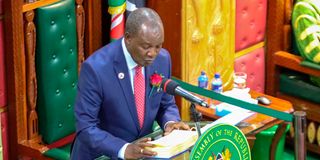Of Ruto, hustlers and Finance Bill 2024

Treasury Cabinet Secretary Prof Njuguna Ndung'u reads the budget proposals at Parliament Buildings Nairobi on June 13, 2024.
What you need to know:
- As the debate on the Finance Bill 2024 rages on, it has sounded like one wail.
- The proposed taxes will lead to increases in the prices of bread and other commodities.
“Meja sat by the ditch swinging his legs this way and that. A few people passed by engrossed in their daily problems and none of them gave the lanky youth a thought. But the searching eyes of Meja missed nothing.
They scrutinized the ragged beggars who floated ghostly past him as closely as they watched the smart pot-bellied executives wrinkling their noses at the foul stench of backyards…
Then Maina came out of the back gate of the supermarket and Meja’s thoughts were diverted to his friend. He ran over and helped him carry the heavy parcels back to the trench.
There in the empty parking lot by the ditch, they unwrapped the bundles and Meja gazed glassy-eyed at their prize.
There were various kinds of fruit in various stages of decay… some rock-hard cakes glared stonily back at them.
Meja sat looking from one type of food to the other. The oranges were no longer orange and beautiful but a deathly grey with mould. The cakes were no longer cakes but fragments of rock, and the chocolate looked like discarded shoe polish.
‘Let’s eat,’ Maina said and his hand dived into the food. Meja was a fraction of a moment slower in responding, but soon they were munching and chewing hungrily”.
These words from Meja Mwangi’s novel, Kill Me Quick, paint the picture of two jobless young men in the city and with nothing to eat but leftovers from rubbish bins. In today’s parlance, Meja and Maina would be referred to as “hustlers”.
Maybe Meja and Maina, like many children in the countryside, had a clichéd imagination of the capital city “as a place of possibilities” with magical, hidden offices.
When they finally reached the city, they realised it was less magical. And they learnt that everything costs money as Lauren Elkin writes about another brutal city, New York City, “Everything costs more than it should. It takes forever to get anywhere. Life moves so fast things are half-over before you notice they’ve begun. It’s dirty, cramped, and smells bad”.
The city, for Meja and Maina, was like what Rayhané Sanders describes as “a place… for grander adventures, bigger horizons, smarter people… a destination to reach… a star to follow, the dream always a little ahead, calling out to you, a siren song: this apartment, this job, this promotion, this reservation, this next goal to reach, this next hill to climb… we’re like little striver-warriors, all of us, swords in hand, slashing dragons as we go”. But Meja and Maina slew no dragons.
They couldn’t slay the dragon of unemployment and as the city hummed and the sun shone brightly, they were eating from garbage cans.
There are many Kenyans like Meja and Maina who represent the typical hustlers who were the centrepiece of President William Ruto's campaign for office.
When the hustlers took power, in the early, heady days, it felt like a coup — the hustlers had toppled the dynasties!
There could have been hints early on, cracks in the façade, a warning that President Ruto had a tough job ahead of him but there was also a lot of hope.
Most Kenyans have not given up…yet. However, who will remember the Mejas and Mainas struggling to get their next meal? Who will hear their cry?
As the debate on the Finance Bill 2024 rages on, it has sounded like one wail, the whole country screaming at once, like a grieving mother with her son dead in her arms — the scream loud and sad and woebegone.
The proposed taxes will lead to increases in the prices of bread, edible oil, sanitary pads, diapers, and other commodities.
Granted, President Ruto’s regime has a lot of balancing to do — not to overtax Kenyans but also collect enough money to run government.
The problem with most of the taxes (even the ones seemingly indirect) is that they have a multiplier effect and, in the end, hit the ordinary “hustler”.
As President Ruto seeks to fund the national budget through the Finance Bill 2024, we hope his regime remembers and addresses the youth unemployment problem (as depicted by Meja and Maina).
As shown in Kill Me Quick, youth unemployment is a ticking time bomb as the youth sooner than later land into trouble and eventually prison.
Meja continues to go in and out of prison, and Maina ends up on trial for murder. Meja and Maina had been in prison together, in Cell Number 9, before Maina was picked by the police to most likely face the hangman.
Towards the end of the novel, “Meja glanced at Maina’s vacant bedding place by his side. The Chief Warder would soon send another person to fill that vacant place. But in reality that bedding place would never be filled. He (Meja) turned over restlessly… On the highway half a mile from cell Number Nine and its sorrow, a car honked and sped towards the sleeping city, with its tall buildings, blinking neon lights, and its unfathomable backstreets and their mysteries”.
Backstreets turning innocent youths into criminals. Youths crying as Meja and Maina did, “If you must kill me, do so fast. Kill me quick”. What desperation! May this regime remember hustlers as embodied by Meja and Maina.
The writer is a book publisher based in Nairobi. [email protected]





